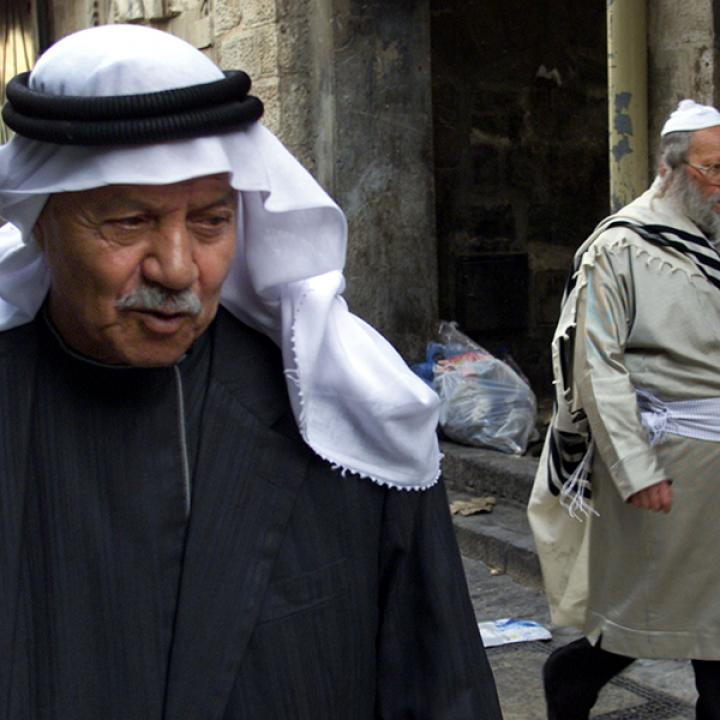

The principal gain yielded by the exchange of ideas between two adversaries is mutual understanding. Admittedly, at the conclusion of a dialogue it could turn out that the pair really do have irreconcilable views – but at least the discussion has allowed both participants to map out the other’s position. This process of just getting to know ‘thy enemy’ would constitute a quantum leap in the several ongoing conflict resolution processes in a Middle East gripped by constant upheaval.
For example, a non-Muslim once argued with me that the Quran endorses anti-Semitism since it describes Jews as 'apes and pigs.’ In response, I pointed out how the two verses he was referring to in the Quran actually stated that God punished the Sabbath breakers by turning them into apes and swine. The misunderstanding of a text—which we clarified with words instead of swords—was lifted: we ended up agreeing that those punished had been condemned for disregarding the commandments, not for their particular religious beliefs.
Other Muslims and non-Muslims have probed further, contending that anti-Semitism is glaringly present in a famous quote, often attributed to the Prophet Muhammad, which states: "The Day of Judgment will not come about until Muslims fight the Jews (killing the Jews), when the Jew will hide behind stones and trees and the stones and trees will say, ‘O Muslim, O Abdulla, there is a Jew behind me, come and kill him.’ Only the Gharkad tree would not do that because it is one of the trees of the Jews.” But a comprehensive review of the Holy Quran, I asserted, demonstrates that no such hadith would exist since it openly contradicts Islamic faith. I have pointed to this, and have reminded those citing this quote that the Prophet instructed his followers to reject any hadith attributed to him which contradicts the text of the Holy Quran; Muslims believe a hadith is the word of man while the Quran is the word of God. Again, dialogue allowed several new and more accurate interpretations like this one to emerge.
The same pattern of false assumptions being corrected through conversations took form during my interactions with Muslims. Most memorable among them, a fellow Muslim once asserted that those who leave Islam should be punished by death, after which I cited scripture that said that deserters should be judged by God alone. On another occasion, a Muslim cleric shared the general misconception among the Muslim community that those who follow Jesus are non-believers because they believe Jesus is the son of God and that he himself is a God; I cited a verse in the Quran affirming that God on the Day of Resurrection would judge regarding matters in which we differ. Once a Muslim sheik asserted that an adulteress woman should be stoned to death but when I gave him the Holy Quran to point out which verse states that message, he failed to find any verse supporting his claim.
Just as this type of dialogue has helped clarify notoriously contentious points of religious divergence, earnest dialogue can also bridge both personal differences, as well as religious and political divides between those in conflict. Establishing additional channels of dialogue could unearth more of these truths around which we have built disparate systems. If a Palestinian contends that Israel is an 'Apartheid State' and an Israeli casts Israel as a 'Democratic State’, both are required to show evidence in support of their arguments. Perhaps they may find that both are right in the sense there are some laws in Israel which give preference to Jews over non-Jews and that there are also laws which demand that all citizens be treated as equal before the law. A further discussion about our and the other’s world-view would lead to those describing Israel as an Apartheid State to point out why they believe so, thus encouraging those democracy-oriented Israelis to work on changing any laws which, in the views of Palestinians, are viewed to be discriminatory against non-Jews or even between Jews themselves. The same applies to Palestinians. When describing a Palestinian as a terrorist, let us not immediately discount those claims as Israeli propaganda and instead examine their potential validity. In other words, many shades of truths do exist. Through dialogue, the discrepancies can be discovered and addressed to form a clearer mutual understanding of the issue.
I do realize that there are those who would disagree with me on both accounts. But instead of pitting camp against the other and succumbing to the "I am right, you are wrong' syndrome, let us all be 'pro-truth.' In seeking truth, we may pave the way for reconciliation and peace through dialogue and the rejection of violence. Truth rules supreme: perhaps violence and terrorism may silence truth seekers temporarily, but ultimately truth will prevail.
Mohammed S. Dajani Daoudi, Weston Fellow at The Washington Institute, founded the Wasatia movement of moderate Islam and is director of the doctoral program in ethics, reconciliation, and moderation at the Wasatia Academic Institute in Jerusalem. This item was originally published on the Fikra website.
"FIkra Forum"



